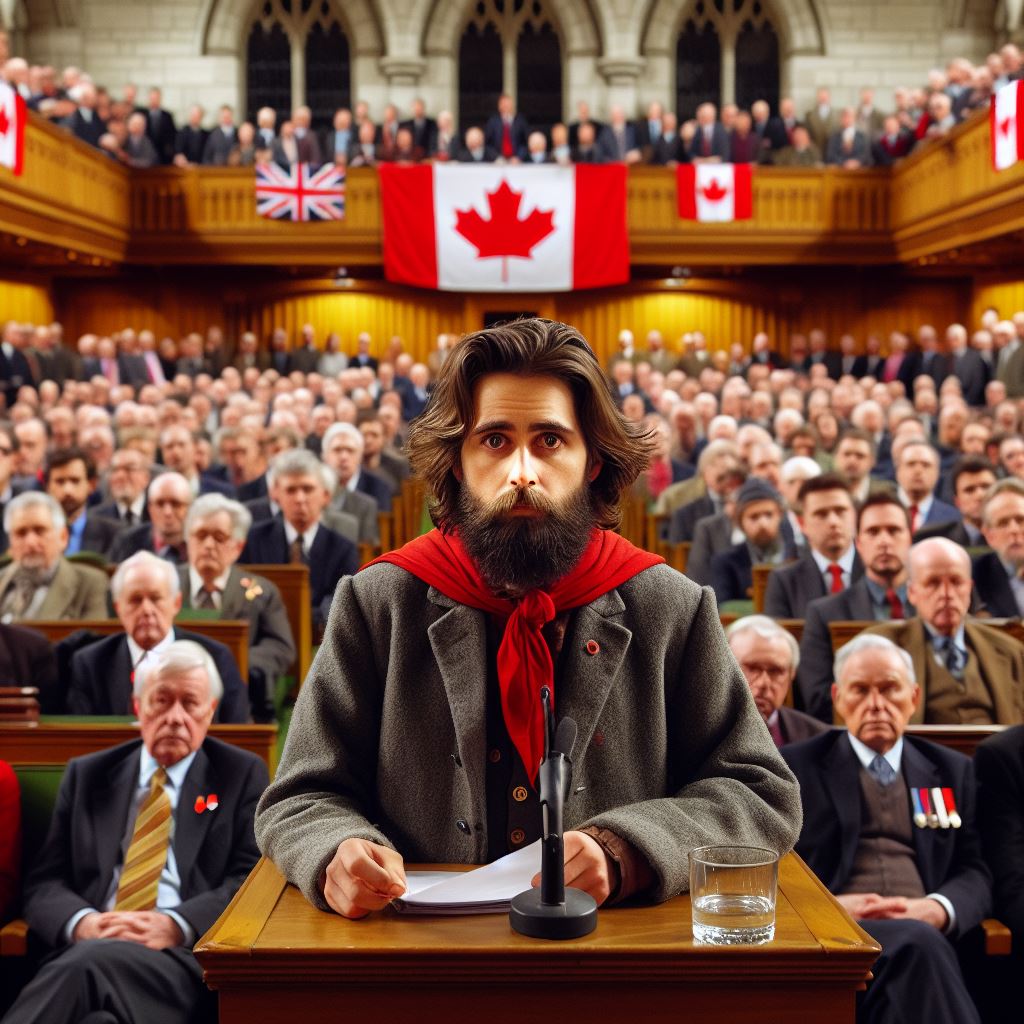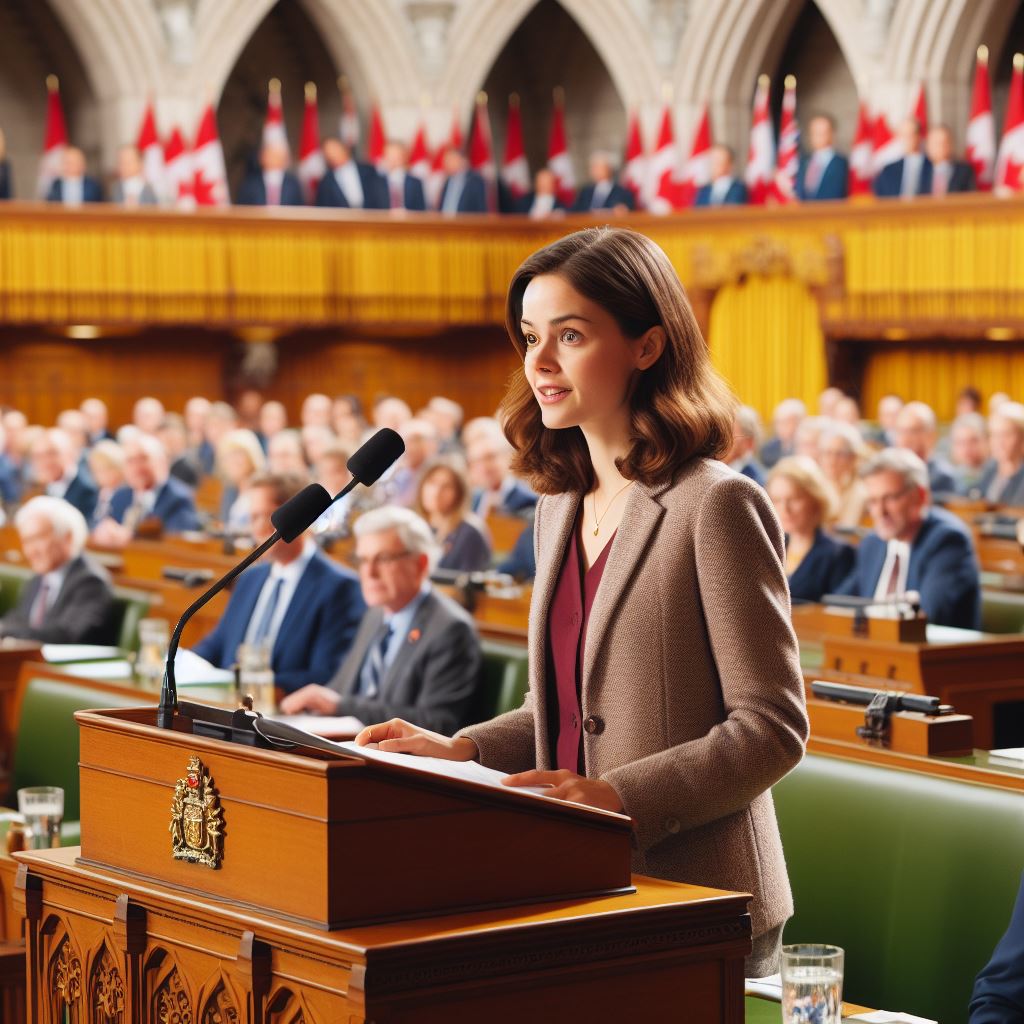Introduction
In Canada, politicians play a crucial role in shaping and implementing policies that affect the nation.
The Canadian political system is based on a parliamentary democracy, with the Prime Minister as the head of government.
The government consists of the executive branch, the legislative branch, and the judicial branch, each with its own powers and responsibilities.
Understanding how Canadian politicians influence policy is essential because it allows citizens to have a better grasp of the decision-making process and hold their elected officials accountable.
By studying the actions and strategies of politicians, citizens can determine the motivations behind policy choices and evaluate their effectiveness.
The influence of Canadian politicians on policy is evident in various ways.
They initiate policy proposals, advocate for specific issues, and shape legislation through debate and voting in parliament.
Politicians also interact with stakeholders, experts, and interest groups to gather information and make informed decisions.
Moreover, politicians serve as representatives of their constituents in policy-making processes.
They listen to the concerns and interests of their constituents and strive to incorporate them into policy development.
This means that Canadian politicians have a duty to reflect the will of the people and ensure that policies align with their needs and preferences.
Overall, the influence of Canadian politicians on policy is far-reaching and significant.
They have the power to shape the laws and regulations that govern the country, impacting the lives of all Canadians.
Therefore, understanding how politicians influence policy is crucial for active citizen participation and effective democratic governance.
Role of Canadian Politicians in Policy-Making
Description of the legislative process in Canada
- The legislative process in Canada starts with the introduction of a bill in either the House of Commons or the Senate.
- Once a bill is introduced, it goes through multiple readings and debates in both houses.
- If the bill passes all readings in one house, it moves to the other house for the same process.
- After passing all readings and debates in both houses, the bill is given Royal Assent by the Governor General.
- Once the bill becomes law, it is referred to as an Act of Parliament.
Influence of elected representatives on policy development
- Elected representatives play a crucial role in policy development as they are the voice of the people.
- They actively engage in debates, propose amendments, and voice concerns during the legislative process.
- Through their participation, elected representatives ensure that policies reflect the needs and interests of their constituents.
- They also act as mediators between government, interest groups, and the public, shaping policies accordingly.
- Elected representatives have the power to introduce private member’s bills, which can shape policy direction.
Role of government ministers in shaping policies
- Government ministers are responsible for developing and implementing policies within their respective portfolios.
- They propose new policies or amendments to existing ones based on expert advice and public consultation.
- Ministers collaborate with their colleagues, stakeholders, and civil servants to ensure policy coherence and effectiveness.
- They also advocate for their policy priorities within the cabinet and defend them in parliamentary debates.
- Government ministers play a crucial role in negotiating international agreements and representing Canada’s interests.
Canadian politicians have a substantial influence on policy-making through their active participation in the legislative process.
They shape policies by proposing bills, engaging in debates, and advocating for the needs of their constituents.
Additionally, government ministers are responsible for developing and implementing policies within their portfolios, ensuring policy coherence and effectiveness.
Read: Understanding Political Campaigns in Canada
Political Parties and Policy Formation
Overview of major Canadian political parties
In Canada, there are several major political parties that play a crucial role in shaping policies.
- Liberal Party of Canada: Known for its progressive stance and strong emphasis on social welfare programs.
- Conservative Party of Canada: Advocates for a free-market economy and limited government intervention.
- New Democratic Party (NDP): Promotes social democracy, workers’ rights, and income equality.
- Green Party of Canada: Focused on environmental sustainability, social justice, and grassroots democracy.
Discussion of how party platforms influence policy decisions
Party platforms are the policy proposals and positions taken by political parties during an election campaign.
- Parties use their platforms to outline their priorities and demonstrate their vision for the country.
- Politicians often include policy promises in their platforms, aiming to appeal to voters and gain support.
- After winning an election, the successful party will work towards implementing their platform policies.
- Party platforms serve as guiding documents, influencing the decisions and direction of policy-making.
Impact of party discipline on the policy-making process
Party discipline refers to the ability of party leaders to maintain unity and control over their members.
- Party discipline is crucial for efficient policy-making, as it ensures all members vote as a unified bloc.
- Party leaders enforce discipline by setting the party’s agenda and punishing dissenting members.
- This discipline allows parties to push forward their policy priorities in a unified manner.
- However, party discipline can limit individual MPs’ ability to vote freely according to their constituents’ preferences.
In fact, Canadian political parties have a significant influence on policy formation.
Their platforms outline their priorities, shape policy decisions, and guide the policy-making process.
While party discipline can be both beneficial and limiting, it plays a crucial role in maintaining party unity
Understanding the influence of political parties helps citizens make informed decisions during elections.
Unlock Your Career Potential
Visualize a clear path to success with our tailored Career Consulting service. Personalized insights in just 1-3 days.
Get StartedRead: The Impact of Social Media on Politicians
Lobbying and Interest Groups in Canada
Explanation of lobbying and interest groups in Canada
In the Canadian political landscape, lobbying and interest groups play a significant role in influencing policy formulation.
Lobbying refers to the process of individuals or organizations attempting to influence politicians and policy decisions.
Interest groups, on the other hand, are organizations formed by individuals with shared interests to advocate for specific causes or policies.
Interest groups in Canada encompass a wide range of sectors and issues, including business, labor, environment, and human rights.
These groups aim to influence policy decisions by raising awareness, conducting research, and engaging in advocacy efforts.
Their influence on policy formulation is substantial, with politicians often seeking their input and considering their recommendations.
Influence of Interest Groups on Policy Formulation
Interest groups typically exert their influence on policy formulation through various channels, such as direct lobbying, public campaigns, and media engagement.
They actively engage with politicians, presenting their perspectives and providing evidence-based arguments to support their cause.
By leveraging their knowledge, expertise, and networks, interest groups can effectively shape policy decisions.
The influence of interest groups can be seen in multiple stages of policy formulation, including agenda setting, policy design, and implementation.
During agenda setting, interest groups raise awareness about their issues, capturing the attention of policymakers and ensuring their causes are considered in the political agenda.
They propose policy alternatives and contribute to policy design by providing valuable input and expertise.
Interest groups also play a crucial role in shaping policy implementation.
By monitoring and evaluating policy outcomes, they can provide feedback to policymakers, highlighting areas for improvement or suggesting modifications.
This ongoing engagement helps ensure that policies are both effective and reflective of the interests and concerns of the targeted groups.
Examples of Successful Lobbying Efforts
Several notable examples illustrate the effectiveness of lobbying efforts by interest groups in Canada.
One such case is the advocacy work of environmental groups, leading to the ban on single-use plastics in various provinces.
Through targeted campaigns and lobbying, these groups successfully raised awareness about the environmental impact of plastic waste, prompting policymakers to take action.
Another example is the influence of labor unions on employment and labor legislation.
Labor unions represent the interests of workers and negotiate with politicians to secure fair wages, safe working conditions, and other labor rights. Their lobbying efforts have resulted in significant policy changes, including improved workplace safety standards and increased minimum wage levels.
Furthermore, healthcare interest groups have played a key role in shaping healthcare policy in Canada.
By advocating for increased funding, better access to healthcare services, and improved patient care, these groups have influenced the allocation of resources and the development of healthcare policies at both federal and provincial levels.
In short, lobbying and interest groups have a considerable influence on policy formulation in Canada.
By actively engaging with politicians, raising awareness, and providing expert input, these groups ensure that their voices are heard and their concerns addressed.
Their successful lobbying efforts have led to significant policy changes across various sectors, shaping the Canadian political landscape.
Read: The Role of MPs: What Canadians Should Know

Public Opinion and Policy-Making
The role of public opinion in Canadian politics is crucial for policy-making.
Politicians closely monitor public sentiment to shape policies that align with the interests of the people.
Public opinion has a significant influence on policy priorities, as politicians strive to address the concerns of the population.
Overview of the Role of Public Opinion in Canadian Politics
- Public opinion refers to the collective views, attitudes, and beliefs of the citizens.
- It plays a vital role in shaping political decisions and policy formulation.
- Politicians must take public opinion into account to maintain their popularity and support.
- Public opinion can result from various factors such as media, social networks, and personal experiences.
- Understanding public opinion is crucial for politicians to gain insight into what policies resonate with the electorate.
How Politicians Gauge Public Sentiment to Shape Policies
- Politicians employ different methods to gauge public sentiment, including surveys, focus groups, and town hall meetings.
- Surveys provide quantitative data, giving politicians a snapshot of public opinion on specific issues.
- Focus groups allow politicians to delve deeper into the reasons behind public sentiment and identify potential concerns.
- Town hall meetings provide a platform for direct interaction, enabling politicians to gauge the reactions of the public firsthand.
- Politicians often analyze media coverage, social media trends, and public debates as indicators of public sentiment.
Influence of Public Opinion on Policy Priorities
- Public opinion has the power to influence policy priorities set by politicians and government officials.
- Politicians are more likely to prioritize issues that receive significant public attention and support.
- Public opinion shapes the political agenda, pushing politicians to address the concerns and demands of the people.
- Politicians modify policies or propose new ones based on public sentiment to gain public support.
- Public pressure and outcry can force politicians to make policy changes to meet the expectations of the electorate.
In essence, public opinion plays a crucial role in Canadian politics and policy-making.
Politicians continuously gauge public sentiment using various methods to shape their policies.
Public opinion influences policy priorities, pushing politicians to address the needs and concerns of the people they represent.
Overall, understanding and responding to public opinion is essential for politicians to build public trust, maintain support, and govern effectively.
Read: Canadian Political Ethics: A Deep Dive
Media Influence on Policy Development
One of the most powerful forces in shaping policy development is the influence of the media.
The media plays a crucial role in shaping public opinion, and politicians often use media platforms to influence policy debates.
The role of media in shaping public opinion
The role of the media in shaping public opinion cannot be underestimated.
Through news outlets, television programs, and online platforms, the media has the power to inform, educate, and influence the general population.
They have the ability to highlight specific issues, frame debates, and sway public support towards certain policies.
Use of media platforms by politicians to influence policy debates
Politicians recognize the power of the media and often use various platforms to shape policy debates.
For example, they may hold press conferences, give interviews, or write opinion pieces to express their stance on specific policies.
By doing so, politicians try to garner attention, support, and ultimately influence decision-making processes.
The use of media platforms by politicians to influence policy debates is not a new phenomenon.
Throughout history, leaders have used newspapers, radio, and television to shape public opinion.
In recent years, social media platforms have also become increasingly popular among politicians.
Examples of media influence on policy outcomes
Examples of media influence on policy outcomes can be found in various contexts.
During elections, politicians often use targeted advertisements to sway public opinion in their favor.
Additionally, media coverage can significantly impact how certain policies are perceived by the public.
One example of media influence on policy outcomes is the debate on climate change.
Through extensive media coverage, the scientific consensus on climate change has become widely accepted by the majority of the population.
This increased public awareness and concern have put pressure on politicians to address the issue and develop relevant policies.
Another example is the role of media in the legalization of same-sex marriage.
Through positive media coverage and widespread public support, politicians were influenced to advocate for changes in legislation.
Media played a key role in shaping public opinion and eventually facilitating policy changes.
Media influence on policy development is not without its criticisms.
Some argue that media bias can distort public perception and skew policy debates in favor of particular interests.
Additionally, the rise of fake news and misinformation poses a significant challenge to the media’s role in shaping policy outcomes.
In general, the media has a substantial influence on policy development by shaping public opinion and providing platforms for politicians to influence debates.
Examples of media influence on policy outcomes can be seen throughout history, such as in debates on climate change and same-sex marriage.
However, it is essential to be critical of media bias and the impact of misinformation.
Challenges and Limitations in Policy Influence
Canadian politicians face various challenges and limitations in their efforts to influence policy.
These constraints include constitutionality and legal limitations, the impact of international relations on policy-making, and the influence of bureaucracy and civil service in policy implementation.
Constitutionality and Legal Limitations
- The Canadian constitution sets the framework for policy-making, imposing limits on the range of policies politicians can propose.
- If a proposed policy conflicts with the constitution, it can be deemed unconstitutional and cannot be implemented.
- Courts play a crucial role in interpreting the constitution and ensuring policy proposals adhere to its principles.
- Additionally, politicians must consider the legality of their proposed policies, as certain actions may be subject to legal challenges.
Impact of International Relations on Policy-making
- Globalization has increased the interdependence of countries, making international considerations an essential aspect of policy-making.
- Canadian politicians must consider the impact of international agreements, treaties, and obligations on their policy decisions.
- International relations can influence policy scope and restrict politicians’ freedom to act unilaterally.
- Furthermore, trade policies, immigration regulations, and environmental agreements are shaped by international relations.
Influence of Bureaucracy and Civil Service in Policy Implementation
- Bureaucracy and civil service play a significant role in policy implementation and can limit politicians’ influence.
- These bureaucratic institutions have expertise, resources, and established procedures that influence policy outcomes.
- Politicians rely on civil servants to provide necessary information and analysis, which can shape their policy choices.
- Civil servants may have their priorities and preferences that can influence the direction and speed of policy implementation.
In a nutshell, Canadian politicians face challenges and limitations when seeking to influence policy.
Constitutionality and legal limitations, the impact of international relations, and the influence of bureaucracy and civil service all shape the boundaries of policy-making.
Despite these limitations, politicians play a crucial role in proposing and shaping policies that reflect the needs and aspirations of Canadian society.
By navigating these challenges with care and strategic planning, politicians can strive for effective policy outcomes.
Conclusion
This blog post discussed how Canadian politicians influence policy.
We highlighted key points such as the power of lobbying, the role of public opinion, and the influence of political parties.
Understanding these factors is crucial for citizens to actively participate in the political process and shape policies that align with their values and interests.
The importance of understanding how Canadian politicians influence policies cannot be overstated.
Policies have a direct impact on our lives, shaping areas such as healthcare, education, and the economy.
By understanding the drivers behind policy decisions, citizens can hold politicians accountable and demand transparent and effective governance.
We encourage our readers to stay informed and engaged in the political process.
This means staying up to date with current events, researching the positions of different political actors, and actively participating in discussions and debates.
By doing so, we can ensure that our voices are heard and that we have a say in shaping the policies that affect us all.
Thank you for joining us on this journey to understand how Canadian politicians influence policy.
Stay informed, stay engaged, and be the change that you want to see in our society.




